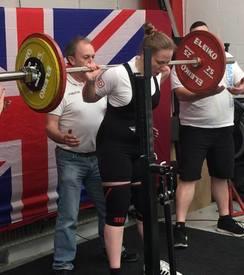Lifting heavy and good form vs heaving

Yogi_Carl
Posts: 1,906 Member
I have been a weightlifter (not bodybuilder) back about twenty five years ago and now returning to it in my early fifties to help maintain lean weight as I drop excess fat.
My question is - I have seen lifters using a bit of swing to get a weight up and then try to control the weight on the negative rep. The argument is that it is inevitable that in order to maintain 3 sets of 5 reps the weight comes more onto the tendns than the belly of the muscle you are working. That is why bodybuilders work more in the region of 8-12 reps so the muscle tissue becomes gorged with blood and shreds more which in repair becomes a bigger muscle. In weight lifters you may see a lighter leaner figure but can handle more weight.
So is a bit of heave inevitable when working with heavier weights or do we aim to keep strict form and accept a slight drop in weight we are working with?
For example, in Bench Press and Squats I was told by my trainer that I could grunt, I could shout to get the weight up but I wasn't allowed to arch my back! In Deadlift we were nt allowed to lean into the bar and then jerk the weight to get it started. We were pretty much handling the weight all the wway without momentum.
Easier said than done.
My question is - I have seen lifters using a bit of swing to get a weight up and then try to control the weight on the negative rep. The argument is that it is inevitable that in order to maintain 3 sets of 5 reps the weight comes more onto the tendns than the belly of the muscle you are working. That is why bodybuilders work more in the region of 8-12 reps so the muscle tissue becomes gorged with blood and shreds more which in repair becomes a bigger muscle. In weight lifters you may see a lighter leaner figure but can handle more weight.
So is a bit of heave inevitable when working with heavier weights or do we aim to keep strict form and accept a slight drop in weight we are working with?
For example, in Bench Press and Squats I was told by my trainer that I could grunt, I could shout to get the weight up but I wasn't allowed to arch my back! In Deadlift we were nt allowed to lean into the bar and then jerk the weight to get it started. We were pretty much handling the weight all the wway without momentum.
Easier said than done.
0
Replies
-
I don't agree with it and I don't practice it. I've seen it done in Crossfit and I just don't see the point! I see potential injury. If I can't lift it correctly, it is too heavy for me.0
-
If you can't do a lift with proper form, and have to resort to swinging it, leaning in some odd direction, or doing something dangerous with your back, then it is too heavy and you should not be attempting to lift it. Lower it and lift correctly and safely. If you use momentum, you are going to eventually get hurt, plus, you are lying to yourself that you can actually lift that weight. If you can't do it right, you aren't actually doing it.0
-
There are exceptions to almost every rule.
The techniques you mentioned could be used to pass a sticking point with an exercise, where the exerciser is unable to complete reps with the next weight up, but their current one is too light. Other methods are available.
Another place you may well see 'cheat reps' is when lifting it used as in metabolic or cardio conditioning, where keeping moving and the heart rate up is more important.
However, these should not be practised at the risk of injury. Especially what your trainer is saying. He's making sure you maintain the ability to walk.0 -
I agree with proper form.
The ability to lift a heavier weight, is IMO, not worth the risk of injury. I love lifting far too much to risk taking months off for recovery.0 -
strict form always. if not, you've got a one way ticket to snap city. if you can't lift it with good form, lower the weight.0
-
Thanks - I agree with all the replies.
So the point f exhaustion for a set is when the movement fails under strict control and not that final rep where you distort your body - for example back bending to get one more bicep curl.
I understand cheat reps and used to use them in the past. Now I would rather lift to my maximum and then throw in a final set of negative reps with a heavier weight to get past any sticking point.0 -
I agree with proper form.
The ability to lift a heavier weight, is IMO, not worth the risk of injury. I love lifting far too much to risk taking months off for recovery.
^^
Don't mind what other people do, do what works for you and won't cause injury. You only get 1 back and 1 set of knees.
screw those up and you can say buh bye to the gym for quite awhile.0 -
That's one thing that always made me roll my eyes at the gym... guys (I'm sure women do it too, but there wasn't many women who lifted more than 5 pounds at my old gym) lifting too heavy and relying more on momentum than strength.0
-
Thanks - I agree with all the replies.
So the point f exhaustion for a set is when the movement fails under strict control and not that final rep where you distort your body - for example back bending to get one more bicep curl.
I understand cheat reps and used to use them in the past. Now I would rather lift to my maximum and then throw in a final set of negative reps with a heavier weight to get past any sticking point.
Failure of form I usually go for. You'll also notice everyone else in the gym is completely oblivious to tempo.
I'd just like to specify that I was talking about cheat repping certain movements, and would like to emphasise not trying to cheat bench or deads as injury is pretty much guaranteed
Not necessarily relevant to you, but you don't know who's reading but not commenting.0 -
Lifting with proper form and appropriate weight = lifting for another day
Swinging or bad form due to weight being too heavy = on the shelf for who knows how long.
Progression will get you where you need to be, it takes time but safe and effective form wins out every time. IMO
I would rather leave a rep on the table then push for something and me end up on the floor.0 -
Unerstood and agreed Iron Smasher.
Thanks for your replies - always helps to get a few opinions to gain a bigger picture even if its just to confirm you were right anyways.0 -
A body in the 50's doesn't have the same resilience or recovery potential as a body in the 20's. If cheating the weight is ever an acceptable risk, it's a risk for the young. Stick with proper technique and you'll stay larger for longer.0
-
Just another person to echo "proper form". Your strength will increase just fine as you progress with careful lifting.0
-
A body in the 50's doesn't have the same resilience or recovery potential as a body in the 20's. If cheating the weight is ever an acceptable risk, it's a risk for the young. Stick with proper technique and you'll stay larger for longer.
On the whole I generally agree with you, though it does depend on the individual in their 20's or 50's you are talking about or comparing. Some of us oldies have looked after ourselves better than some in their 20's I could mention.
Proper technique definitely and don't use special techniques such as cheat reps unless you know what you are doing - whatever your age.0
This discussion has been closed.
Categories
- All Categories
- 1.4M Health, Wellness and Goals
- 397K Introduce Yourself
- 44.2K Getting Started
- 260.9K Health and Weight Loss
- 176.3K Food and Nutrition
- 47.6K Recipes
- 232.8K Fitness and Exercise
- 456 Sleep, Mindfulness and Overall Wellness
- 6.5K Goal: Maintaining Weight
- 8.7K Goal: Gaining Weight and Body Building
- 153.3K Motivation and Support
- 8.3K Challenges
- 1.3K Debate Club
- 96.5K Chit-Chat
- 2.6K Fun and Games
- 4.5K MyFitnessPal Information
- 16 News and Announcements
- 18 MyFitnessPal Academy
- 1.4K Feature Suggestions and Ideas
- 3.1K MyFitnessPal Tech Support Questions








